Django developers are the backbone of your web applications, ensuring that the server-side logic, database interactions, and overall backend functionality are robust and efficient. They work closely with front end developers to create seamless and dynamic web experiences.
Django development skills encompass a range of technical proficiencies, including expertise in Python, Django framework, and database management. Additionally, skills such as problem-solving, teamwork, and effective communication are crucial for success in this role.
Candidates can write these abilities in their resumes, but you can’t verify them without on-the-job Django Developer skill tests.
In this post, we will explore 8 essential Django Developer skills, 9 secondary skills and how to assess them so you can make informed hiring decisions.
Table of contents
8 fundamental Django Developer skills and traits
The best skills for Django Developers include Python Proficiency, Django Framework, RESTful APIs, Database Management, Version Control, HTML/CSS/JS, Testing/Debugging and Security Practices.
Let’s dive into the details by examining the 8 essential skills of a Django Developer.
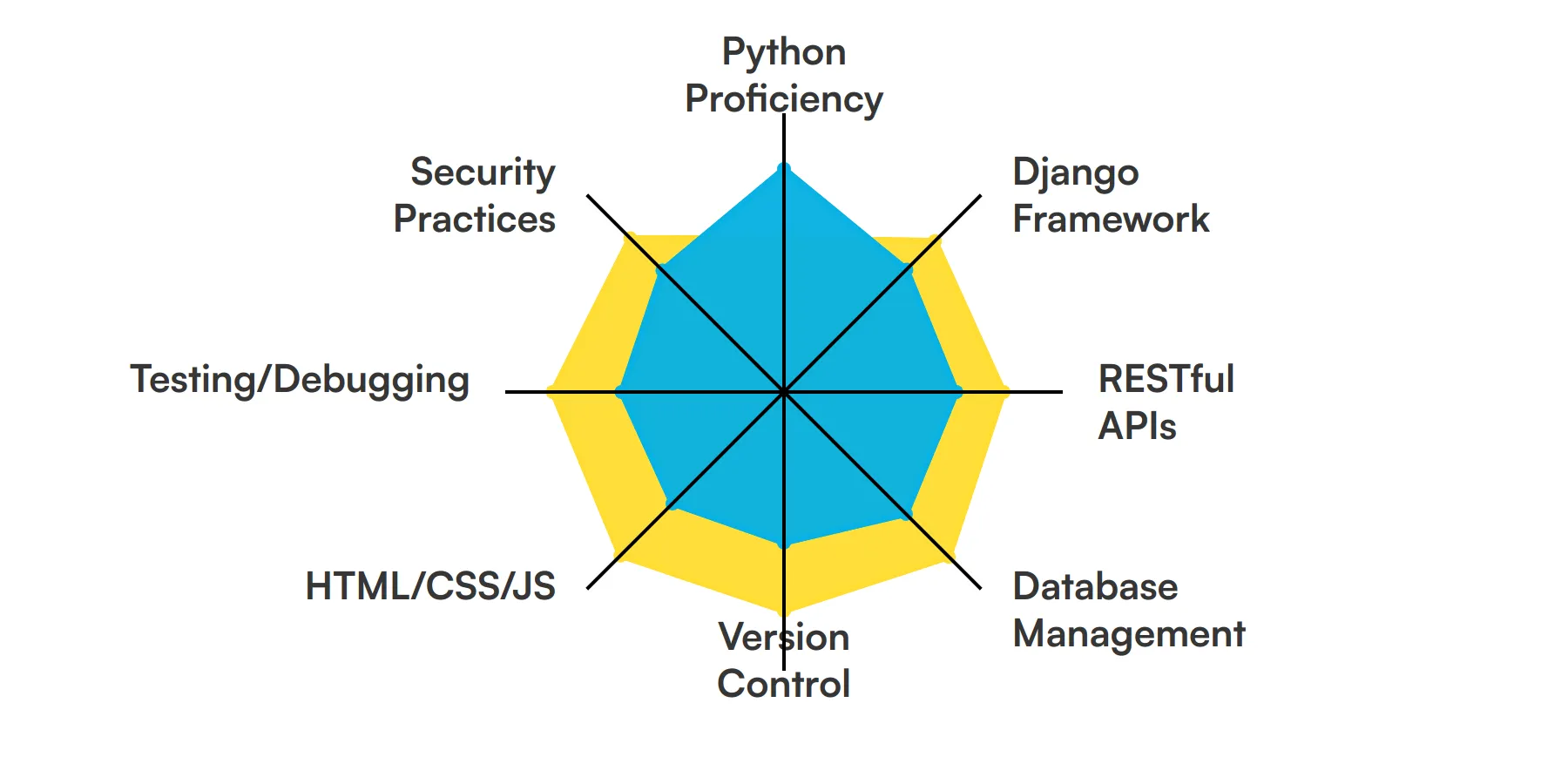
Python Proficiency
A Django developer must be adept in Python, as Django is a high-level Python web framework. Understanding Python allows the developer to effectively build clean and readable code, which is crucial for maintaining and scaling applications.
For more insights, check out our guide to writing a Python Developer Job Description.
Django Framework
Knowledge of Django itself is fundamental for a Django developer. This includes understanding Django’s ORM, middleware, templating, forms, routing, and authentication. This skill ensures the developer can utilize Django’s components to efficiently build and deploy secure web applications.
RESTful APIs
Creating and integrating RESTful services is essential for a Django developer to enable their applications to communicate with other systems and services. This skill is used to extend the functionality of web applications and improve interoperability.
Check out our guide for a comprehensive list of interview questions.
Database Management
Proficiency in database systems, particularly relational databases like PostgreSQL or MySQL, is necessary. A Django developer uses this skill to design, query, and manage databases that store application data securely and efficiently.
Version Control
Understanding version control, especially Git, is necessary for Django developers to manage changes to the project codebase, collaborate with other developers, and maintain a history of project evolution.
HTML/CSS/JS
A solid grasp of front-end technologies including HTML, CSS, and JavaScript is important for a Django developer to create intuitive and responsive user interfaces. This skill bridges the gap between server-side operations and client-side experience.
For more insights, check out our guide to writing a HTML5 Developer Job Description.
Testing/Debugging
A Django developer must be skilled in writing tests and debugging applications. This involves using tools and frameworks like PyTest or Django’s own testing framework to ensure the application runs smoothly and is free from critical bugs.
Security Practices
Knowledge of security practices is critical to protect the application from vulnerabilities such as SQL injection, CSRF, and XSS. Django developers use this skill to implement security measures in the applications they build.
Check out our guide for a comprehensive list of interview questions.
9 secondary Django Developer skills and traits
The best skills for Django Developers include Agile Methodologies, DevOps Principles, Cloud Services, Web Servers, Asynchronous Tasks, Search Engine Integration, API Design, UI/UX Design and WebSocket Usage.
Let’s dive into the details by examining the 9 secondary skills of a Django Developer.
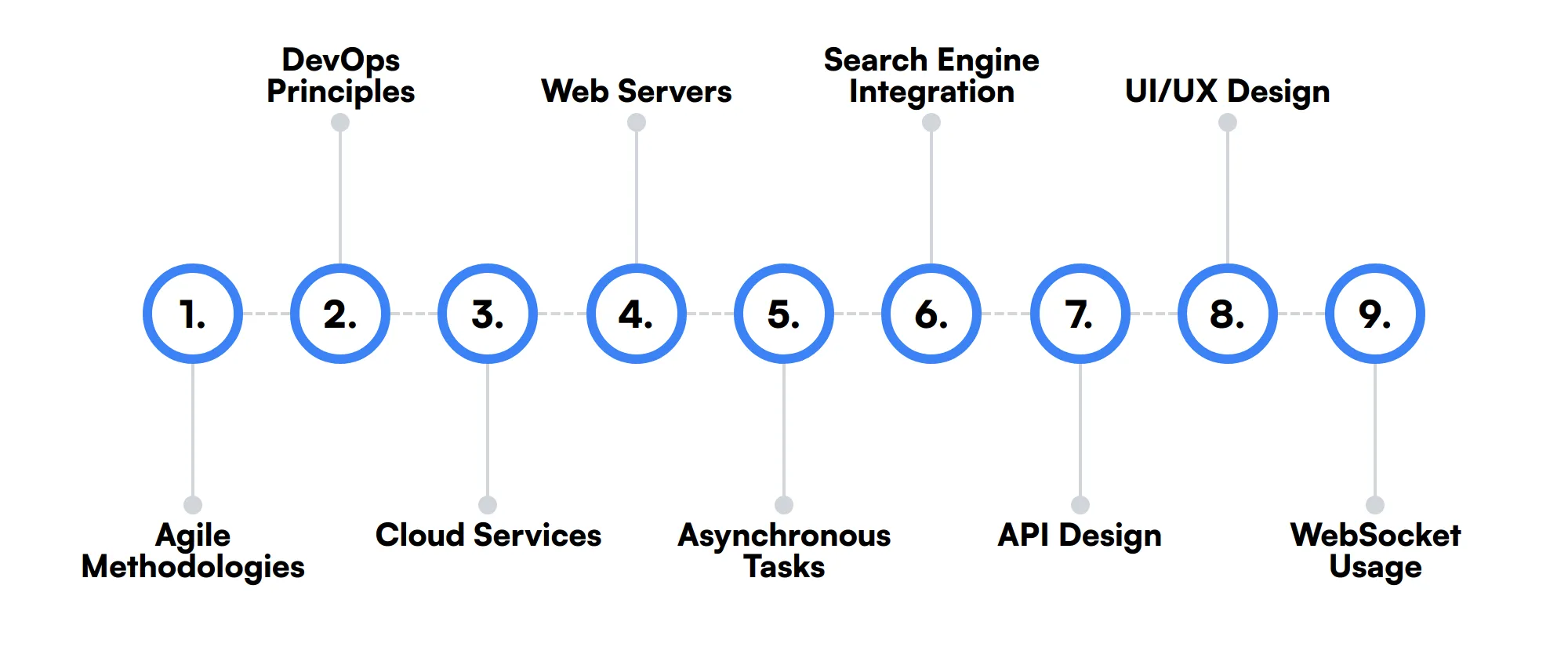
Agile Methodologies
Familiarity with agile methodologies like Scrum or Kanban can help Django developers work more effectively in teams, adapt to changing project requirements, and improve project delivery timelines.
DevOps Principles
Understanding basic DevOps principles such as CI/CD, containerization with Docker, and orchestration with Kubernetes can be beneficial for Django developers to streamline development, testing, and deployment processes.
Cloud Services
Experience with cloud platforms like AWS, Azure, or Google Cloud can enhance a Django developer’s ability to deploy applications in scalable environments, manage cloud resources, and optimize application performance.
Web Servers
Knowledge of web server configuration and management, particularly with servers like Nginx or Apache, is useful for deploying and managing the performance of Django applications.
Asynchronous Tasks
Understanding how to handle asynchronous tasks using Celery with Django can be a valuable skill for improving application efficiency and handling background tasks.
Search Engine Integration
Integrating search engines like Elasticsearch or Solr can significantly enhance the functionality of Django applications by providing powerful search capabilities and handling large volumes of data.
API Design
Skills in API design are important for creating well-structured, efficient, and easy-to-use APIs that other applications and developers can interact with effectively.
UI/UX Design
While not typically the main role of a Django developer, having an understanding of UI/UX design principles can help in delivering more user-friendly web applications.
WebSocket Usage
Knowledge of WebSockets for real-time data transfer can enhance a Django developer’s toolkit, enabling them to build interactive features like live notifications and real-time updates.
How to assess Django Developer skills and traits
Hiring a Django developer involves more than just glancing at a resume; it requires a deep understanding of their technical capabilities and personal traits. To truly assess a Django developer, one must evaluate their proficiency across a range of skills including Python, the Django framework itself, RESTful APIs, database management, version control, front-end technologies like HTML/CSS/JS, and their approach to testing, debugging, and security.
Traditional hiring methods often fall short in accurately gauging these competencies. This is where skills assessments come into play, offering a more objective and comprehensive evaluation of a candidate's abilities. By using tailored assessments, employers can see beyond the resume to understand how a candidate performs in real-world scenarios.
Adaface assessments provide a detailed analysis of a candidate's skills, helping to ensure that you only move forward with the most qualified individuals. These tests are designed to mirror the actual challenges a Django developer will face on the job, making it easier to find candidates who are not only technically proficient but also a good fit for your team's dynamics. With Adaface, you can achieve a 2x improvement in the quality of your hires and significantly reduce the time spent screening candidates.
Let’s look at how to assess Django Developer skills with these 6 talent assessments.
Python Online Test
Our Python Online Test evaluates a candidate's proficiency in Python, covering a wide range of topics from basic syntax to complex concepts like OOP and database manipulation.
The test assesses their understanding of Python data structures, error handling, file operations, and the use of in-built functions and modules. It also tests their skills in scripting, web scraping, and debugging.
Successful candidates demonstrate a strong grasp of both procedural and object-oriented programming paradigms, as well as the ability to effectively solve problems using Python.
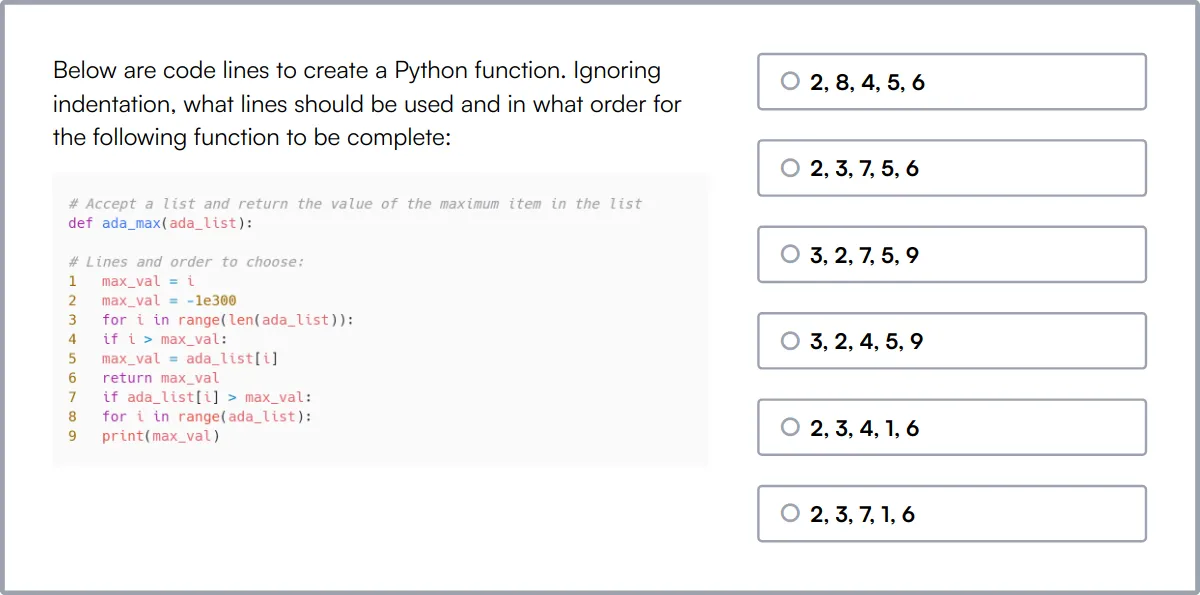
Django Online Test
Our Django Online Test measures a candidate's expertise in the Django web framework, assessing their ability to build and maintain web applications.
This test evaluates knowledge in Django fundamentals, including models, views, templates, forms, URL routing, and authentication. It also covers testing and deployment within the Django ecosystem.
Candidates who perform well on this test are proficient in using Django to create complex, database-driven websites and understand the full web development cycle.
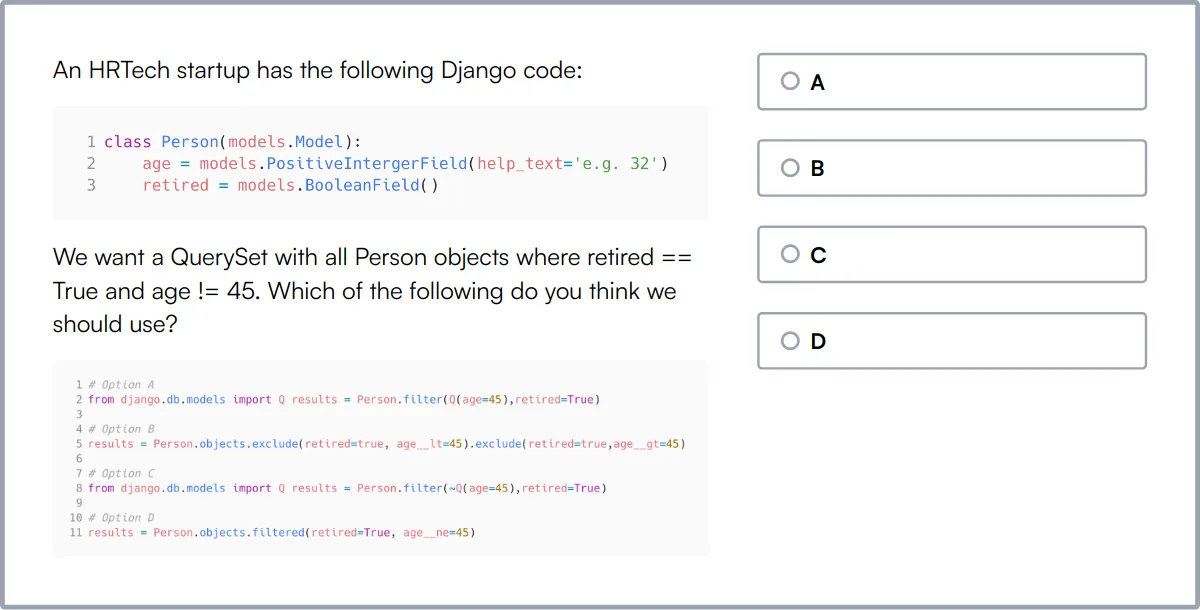
REST API Test
Our REST API Test focuses on a candidate's ability to design and interact with RESTful APIs, an important skill for backend and API developers.
The test covers REST API basics, API design, best practices, and backend service architecture. It also evaluates the candidate's technical aptitude and coding skills related to API development.
High-scoring individuals are adept at creating scalable and maintainable APIs, and they possess a deep understanding of HTTP protocols and API security measures.
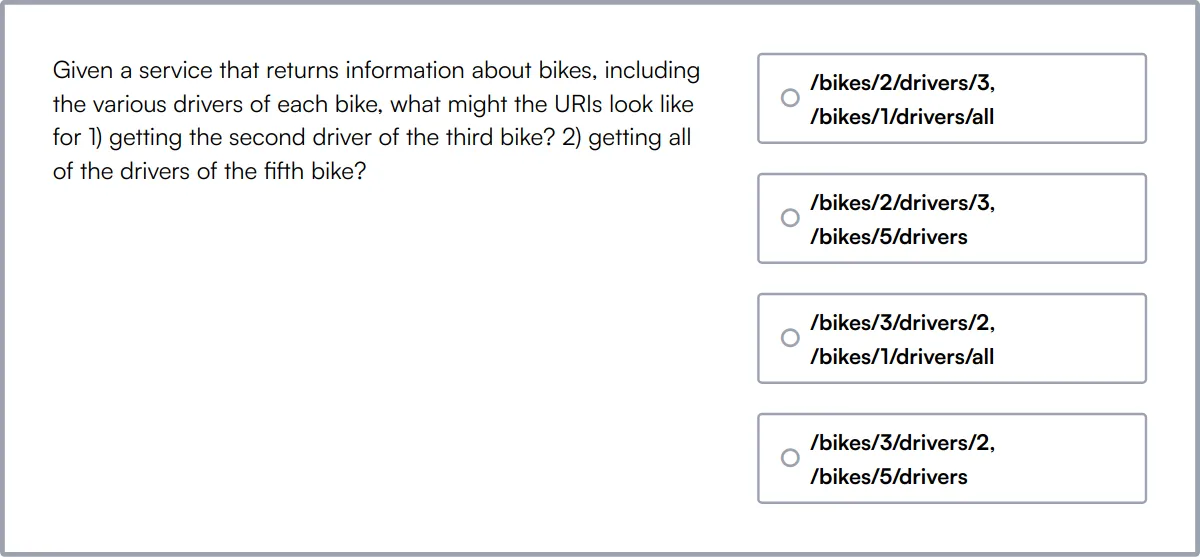
MySQL Online Test
Our MySQL Online Test assesses a candidate's ability to use MySQL for database management and manipulation, crucial for roles involving data handling.
The test evaluates proficiency in SQL queries, database design, normalization, indexing, and the use of advanced features like stored procedures and triggers.
Candidates excelling in this test demonstrate a thorough understanding of database architecture and the ability to optimize database performance and integrity.

Git Online Test
Our Git Online Test evaluates a candidate's knowledge of Git, a key tool for version control in software development projects.
The test challenges candidates on repository management, branching, merging, conflict resolution, and the use of remote repositories. It also tests their understanding of rebasing and various Git workflows.
Proficient candidates can effectively manage source code history, collaborate with teams, and maintain a streamlined and secure development process.
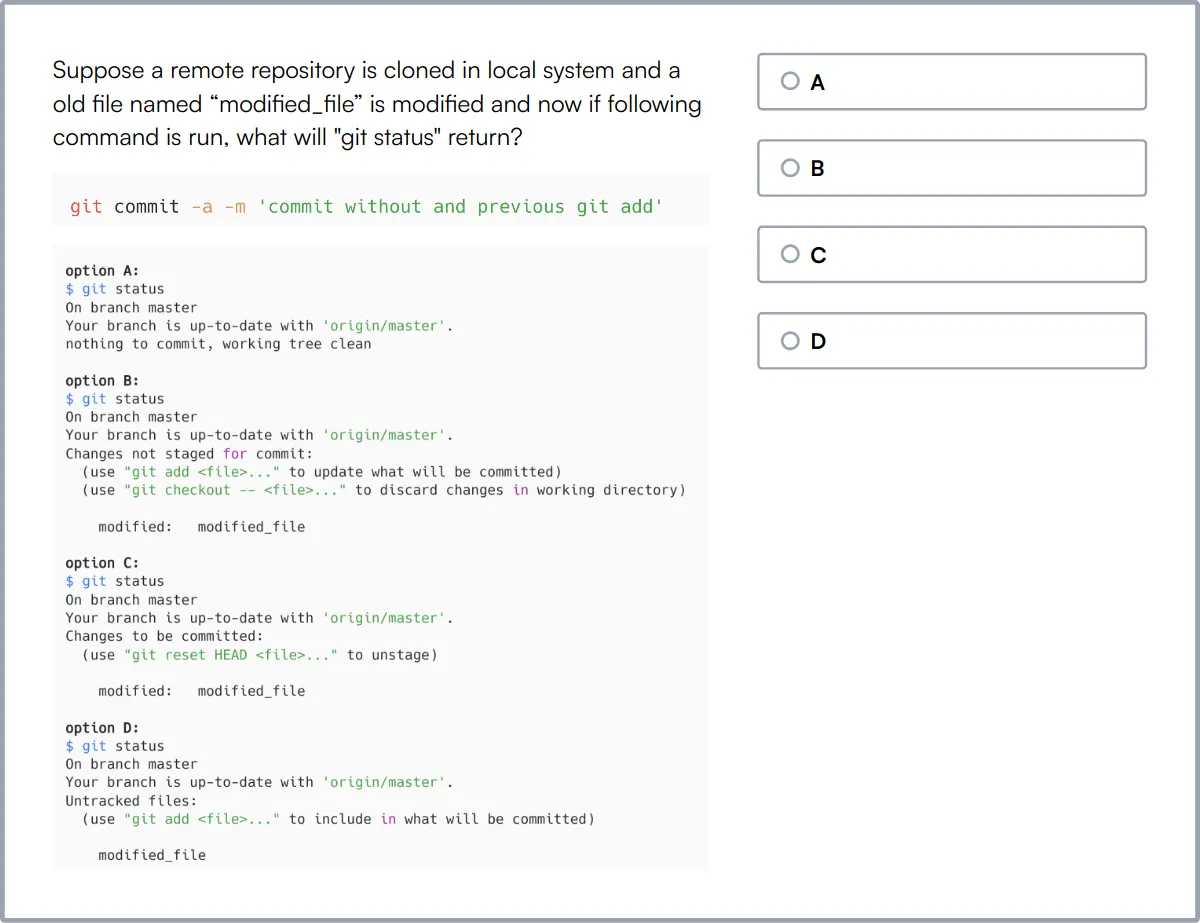
JavaScript & HTML/CSS Online Test
Our JavaScript & HTML/CSS Online Test gauges a candidate's understanding of web development using JavaScript along with HTML and CSS.
This test assesses their knowledge of JavaScript ES6, OOP in JavaScript, handling APIs, and asynchronous programming. It also evaluates their skills in CSS layout techniques like Flexbox and Grid, and responsive design.
Candidates who score well are proficient in front-end development, capable of building interactive and well-designed web interfaces.
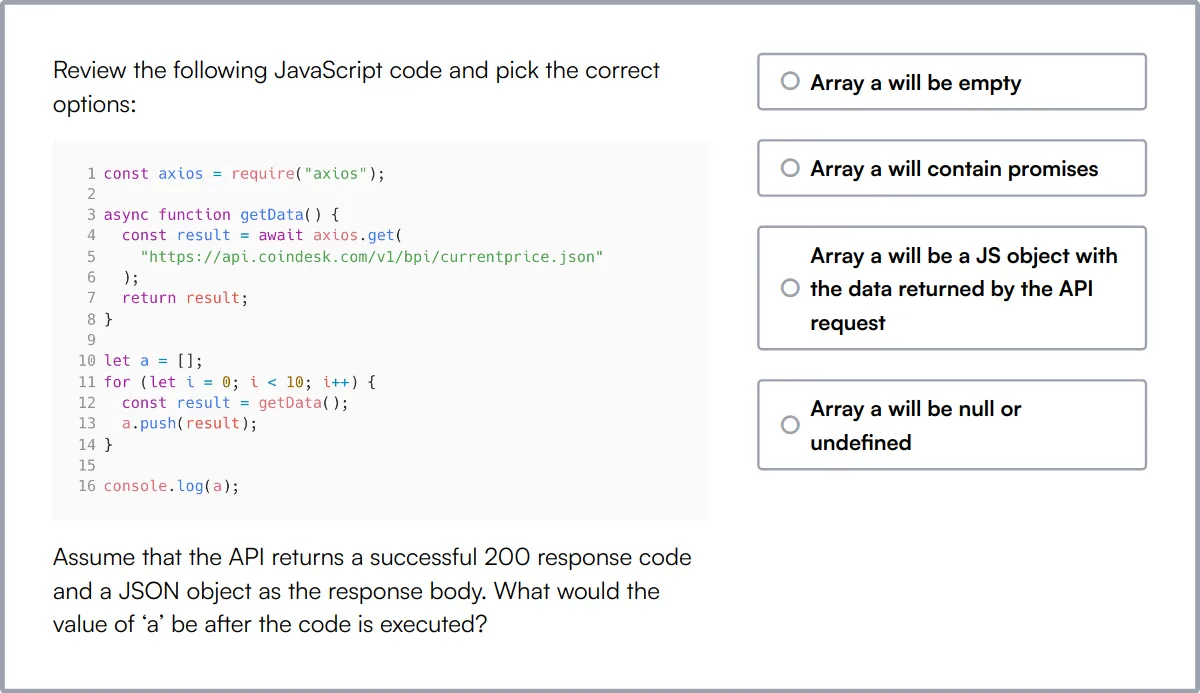
Summary: The 8 key Django Developer skills and how to test for them
| Django Developer skill | How to assess them |
|---|---|
| 1. Python Proficiency | Evaluate the developer's ability to write clean, efficient Python code. |
| 2. Django Framework | Assess the developer's expertise in building web applications using Django. |
| 3. RESTful APIs | Check the developer's skill in designing and implementing RESTful APIs. |
| 4. Database Management | Measure the developer's capability in handling and querying databases. |
| 5. Version Control | Determine the developer's proficiency in using Git for version control. |
| 6. HTML/CSS/JS | Gauge the developer's ability to create well-structured, user-friendly interfaces. |
| 7. Testing/Debugging | Assess the developer's skills in identifying and fixing bugs. |
| 8. Security Practices | Evaluate the developer's knowledge of web security best practices. |
Django Online Test
Django Developer skills FAQs
What Python skills should a Django developer have?
A Django developer should be proficient in Python, understanding its syntax, data structures, and OOP concepts. They should also be familiar with Python libraries and tools relevant to web development.
How important is knowledge of RESTful APIs for a Django developer?
Understanding RESTful APIs is important for Django developers as it enables them to build efficient, scalable web services and integrate with other services and applications.
What are the best practices for database management in Django?
Django developers should be skilled in designing models, performing migrations, and optimizing queries. They should also be familiar with Django's ORM to interact with databases efficiently.
Why is version control important for Django development?
Version control, such as Git, is key in Django development for tracking changes, collaborating with other developers, and maintaining the integrity of the codebase.
Can you explain the role of testing and debugging in Django?
Testing and debugging are critical for ensuring the reliability and performance of Django applications. Developers should use Django's test framework and debugging tools to identify and fix issues.
What should a Django developer know about security practices?
A Django developer should implement security measures like user authentication, permissions, secure data handling, and protection against common vulnerabilities like SQL injection and XSS.
How does understanding Agile methodologies benefit a Django developer?
Knowledge of Agile methodologies helps Django developers manage projects more effectively, adapt to changing requirements, and improve collaboration and communication within teams.
What is the significance of DevOps principles in Django development?
DevOps principles facilitate continuous integration and delivery, improve deployment practices, and enhance collaboration between development and operations teams in Django projects.
Assess and hire the best Django Developers with Adaface
Assessing and finding the best Django Developer is quick and easy when you use talent assessments. You can check out our product tour, sign up for our free plan to see talent assessments in action or view the demo here:

40 min skill tests.
No trick questions.
Accurate shortlisting.
We make it easy for you to find the best candidates in your pipeline with a 40 min skills test.
Try for freeRelated posts
Free resources



